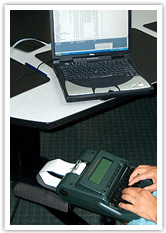 When people ask what I do for a living and I respond, “I am a court reporter”, it usually merits one of these two questions:
When people ask what I do for a living and I respond, “I am a court reporter”, it usually merits one of these two questions:
- “Which court do you work in?”
- “So, you work in courtrooms like those people on Law & Order that I see typing on machines, right?”
But little do they know that there are actually two main types of court reporters, freelance reporters and official reporters and there is a huge difference between the two.
Freelance Court Reporters
Freelance court reporters can be considered independent contractors, which means you are technically “self-employed”, or employees, depending how the court reporting firm is structured. Freelancers work for court reporting agencies which are hired by law firms, attorneys, corporations and other organizations. These agencies work with freelancers to cover depositions, examinations under oath, hearings and board meetings.
Freelance court reporters are typically on-call. Most agencies call a reporter one day in advance of an assignment. One perk of being a freelancer is that you usually travel to different locations. Some reporters enjoy this aspect and prefer not to work in the same location every day. Another benefit of freelancing is that you get to return home after the job is done to work on transcription, and you can work comfortably in your own home. However, a downside of the job is that freelancers usually don’t receive benefits such as health insurance.
Official Court Reporters
Official court reporters are employed by the courts and are sometimes assigned to a particular judge or courtroom. They can cover a variety of court cases, from lower court cases to high-profile cases, depending on which district or court they work in. Many jurisdictions require official reporters to pass certifications, such as the RPR (Registered Professional Reporter) and CRR (Certified Realtime Reporter), that test their written knowledge and skills before qualifying to work in the courts. But even upon passing the required certifications, being accepted for an officialship normally takes time. It is common for reporters to wait years before being considered since courts receive a high volume of applicants. Many reporters desire an officialship since it offers more stability as opposed to freelancing. Official reporters have set salaries, set hours, and benefits such as health insurance and pensions. There are also opportunities to earn additional money on top of your set salary, such as when attorneys order transcripts.
In May 2012, Forbes listed a court reporter/stenographer position as one of the best paying jobs that do not require a four-year degree. There are many pros and cons to both positions as a freelance court reporter and an official court reporter. Being an official court reporter provides the stability that many freelancers covet. On the other hand, reporters who value their flexibility tend to enjoy being freelance court reporters.
 What is the difference between a job and a profession? A job typically requires minimal experience and education. All that is needed is a minimum amount of skills to get the job done. A profession requires a high level of knowledge and skills. Individuals in professions are not easily replaceable since their education, extensive training, and skills make them unique assets. As a result, professions generally have higher levels of compensation.
What is the difference between a job and a profession? A job typically requires minimal experience and education. All that is needed is a minimum amount of skills to get the job done. A profession requires a high level of knowledge and skills. Individuals in professions are not easily replaceable since their education, extensive training, and skills make them unique assets. As a result, professions generally have higher levels of compensation. The skills required to be a court reporter are numerous. You have to be able to write accurately at high rates of speed. You need specialized knowledge in many areas, such as legal procedures, grammar, punctuation, technology and professional practices.
The skills required to be a court reporter are numerous. You have to be able to write accurately at high rates of speed. You need specialized knowledge in many areas, such as legal procedures, grammar, punctuation, technology and professional practices. Learning about reporting is far different than actually working as a reporter. Students often worry about whether or not they’ll be able to handle a court reporting career, but there are steps you can take to avoid being unprepared for the life of a working court reporter.
Learning about reporting is far different than actually working as a reporter. Students often worry about whether or not they’ll be able to handle a court reporting career, but there are steps you can take to avoid being unprepared for the life of a working court reporter. For years, people have been warning court reporters and students that the future of court reporting is doomed. But contrary to the warnings, the industry has not collapsed. It is alive and well, even thriving due to advancements that have strengthened the profession.
For years, people have been warning court reporters and students that the future of court reporting is doomed. But contrary to the warnings, the industry has not collapsed. It is alive and well, even thriving due to advancements that have strengthened the profession.